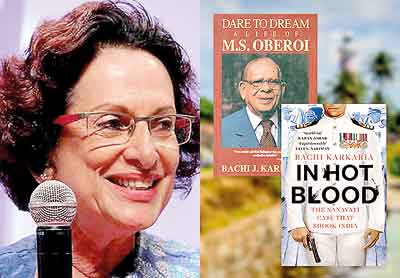Bachi Karkaria: Bringing alive a famous “crime passionnel” of 1950s Bombay
View(s):Why on earth should anyone be interested in reading a book about a domestic murder case that took place nearly 60 years ago?
A reviewer writing in Scroll.in had three reasons:
First, the 1959 case was significant from the legal point of view which ultimately resulted in the dismantling of the jury system in India. Second, it was a case that was distorted by the involvement of media and politicians.
 Third – perhaps most important – it read like something out of a novel: Nanavati, the heroic, honourable husband, Sylvia, the exotic foreign wife who has been led astray by Ahuja, the sleazy, wealthy, hard-drinking seducer, the conflict between the realms of sordid commerce and the noble Armed Forces, the upright Parsi community and the supposedly devious Sindhi community.
Third – perhaps most important – it read like something out of a novel: Nanavati, the heroic, honourable husband, Sylvia, the exotic foreign wife who has been led astray by Ahuja, the sleazy, wealthy, hard-drinking seducer, the conflict between the realms of sordid commerce and the noble Armed Forces, the upright Parsi community and the supposedly devious Sindhi community.
Bringing the scandal to light in 2017 is the writer Bachi Karkaria whose book ‘In Hot Blood’ brings alive the infamous Nanavati case, which many in India still remember. Writing in Verve magazine, a journalist praised Karkaria’s gift of bringing alive the story against the heady times of the then-Bombay’s swish set in the 1950s. The author recreated a glamorous world, far removed from today’s Mumbai.
Of course, those who hear the title, will immediately recall another book about an infamous crime. In Cold Blood was Truman Capote’s most famous work, but laughing Karkaria says she couldn’t lift the title because the crime she described was very “crime passionnel.”
“To my delight, reviewers have almost uniformly described In Hot Blood as a ‘page-turner’, but they have also called it investigative journalism at its best,” she says, explaining. “The challenge was to collect huge tracts of information and funnel it into readable prose.”
Being a senior journalist helped Kakaria hugely.“Discovery was the most enjoyable part,” she says, adding, “I approached the book as a journalist with a deadline, not with the luxury of cogitating over it.”
But chance played its part as well, and Kakaria has many instances of serendipity to thank for the book. For example, in order to learn more about the real Prem Ahuja, who was murdered, she apparently spread her net wide among the Sindhi community, especially among the 80 plus age group, but drew a blank. But then an old gentleman whom Karkaria bumped into by chance at a funeral turned out to have been a friend of Prem Ahuja’s sister, Mamie, who had dropped tantalisingly out of sight after the murder.
The final book took her 12 months to write, which she described as a “year of living obsessively.” Other than her columns, she put all other work on hold, and almost all her personal life as well. “I enjoyed meeting fascinating new people, exploring the unfamiliar domains of the law and the Navy, picking some of the country’s best brains, and piecing together what was such a far-reaching case — and such a compelling story,” she told journalists.
In an interview with the actor Amitabh Bachchan, a close friend, Karkaria described the impact the case had on the legal system:
“When the High Court convicted Nanavati of murder and sentenced him to life imprisonment, there were just 50 days left for the historic formation of Maharashtra State,” she said. “Still, he [Governor Sri Prakasa] found the time to issue an order suspending the High Court’s sentence, so that the warrant of arrest could not be served to Nanavati. The judicial community was up in arms. Finally, a Constitution Bench of the Supreme Court had to be set up to interpret the ambit of the Governor’s powers of pardon. Pandit Nehru himself was forced to defend the Governor’s order in Parliament.”
Since its release, ‘In Hot Blood’ book has since been lauded as a “textbook for millennials” to let them know they didn’t invent anything – sex, viral marketing and most fascinatingly, trial by media.
An Indian-Parsi author, Karkaria is a journalist and former Editor of the Times of India. She describes herself as a “chronicler of urbania.”
She has written a biography of M.S. Oberoi, founder of Oberoi hotels, called “Dare to Dream” (2006), and is best known for her weekly newspaper satirical column – Erratica.
Karkaria was the first Indian on the board of the World Editors Forum, is a recipient of the US-based Mary Morgan-Hewitt Award for Lifetime Achievement, and a Jefferson Fellow of the East West Centre, Honolulu. She is on the advisory boards of the National AIDS Control Organisation and the India AIDS Initiative of the Bill & Melinda Gates Foundation.


